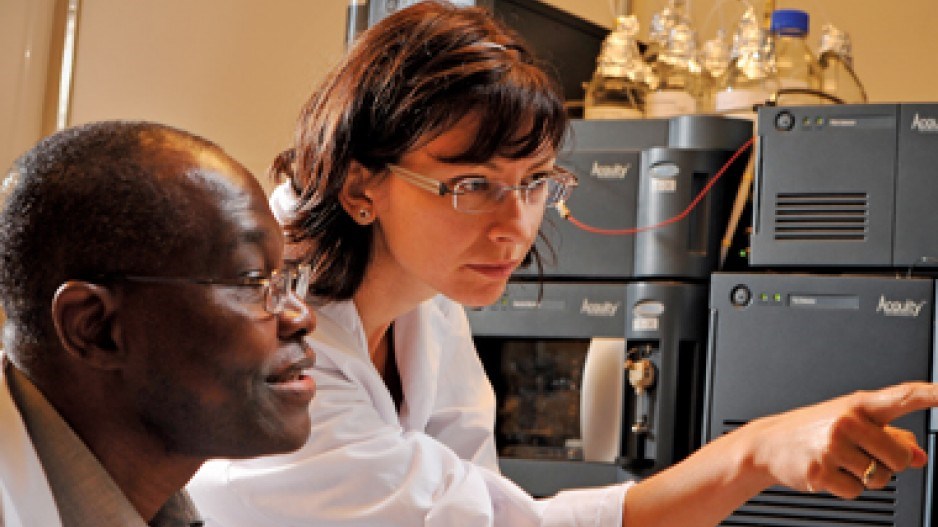In the coming weeks, two new local biotechnology companies are expected to be formally incorporated: one in biologics, the other in oncology.
Both are the progeny of the Centre for Drug Research and Development (CDRD), an incubator and accelerator for Canadian biotechnology companies.
And thanks to $900,000 in funding from Genome BC – which the CDRD is using to leverage another $1.6 million, mostly from Big Pharma – seven new genomics-based research projects will receive funding to help them speed to commercialization.
One of the seven projects identified for funding is research at the University of BC’s Michael Smith Laboratories into yeast genetics to discover genes that may cause chromosome instability of cancer cells. The research is aimed at finding genes that, when mutated, selectively kill cancer cells but not normal ones.
Philip Hieter, who heads the team of 12 researchers, said the CDRD has helped him file provisional patents and provide drug screening of thousands of compounds – something his lab simply doesn’t have the equipment, staff or expertise to do itself.
“We don’t have the resources,” Hieter said. “[CDRD has] robotics and chemical libraries and staff that know how to use them.”
Ultimately, the goal is to develop leads that Big Pharma would be interested in investing in.
All of the projects receiving funding have been identified as being commercially viable.
Brad Popovich, chief scientific officer for Genome BC, said the CDRD has a proven track record of using government funding to leverage private-sector investment from large pharmaceutical companies, like Pfizer (NYSE:PFE), GlaxoSmithKline (NYSE:GSK) and Johnson & Johnson (NYSK:JNJ).
Incorporated in 2007, the CDRD is based at UBC and has labs at the BC Cancer Agency and Simon Fraser University as well as nodes across Canada. With a staff of 100, the CDRD has all the divisions that a big biopharmaceutical company has, including drug screening.
It acts as an accelerator that takes promising research from universities and helps them with proof of concept.
“We take these projects from academia, we validate their work and then we add value to put them on the commercial pathway,” said CDRD CEO Karimah Es Sabar.
While there are numerous accelerators for other technology companies in Canada, until recently there has been little in the way of accelerators for the biotech space. Currently, out of 46 CDRD-funded projects found to be viable, nine have moved to some stage of commercialization.
Three are drug-licensing deals between pharmaceutical companies and universities that developed the drugs and one is a new company.
Two other new biotechs – one in biologics, the other in cancer therapies – are expected to be formally incorporated in the coming weeks, with the help of CDRD’s venture arm, CDRD Ventures Inc. (CVI). Three other ventures in CVI are in co-development partnerships with global pharmaceutical companies. None of the five companies has been identified yet.
But one of the first companies to get help from CDRD was Precision NanoSystems, which manufactures tools for making the nanoparticles used as medicines.
The company – spun out of research from UBC – is not a graduate per se of CDRD’s incubator or accelerator program but Precision CEO and co-founder James Taylor said it benefited from its links with the organization and has received funding from Genome BC.
Getting access to funding
One of the problems Canadian biotechs face is access to markets and capital, both of which tend to be concentrated in the U.S., particularly California.
Companies like Precision have benefited from a program funded by the Canadian Trade Commission. The Canadian Technology Accelerator (CTA) in Silicon Valley has helped firms like Precision get a toehold in that key market.
Precision now has a satellite office in San Francisco, thanks to the CTA, and is part of the QB3 Garage, a network of biotech incubators in Silicon Valley.




